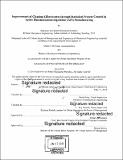Improvement of cleaning effectiveness through Statistical Process Control in active pharmaceutical ingredient (API) manufacturing
Author(s)
Nechlani, Rajkumar aka Rahul Shankarlal
DownloadFull printable version (25.04Mb)
Alternative title
Improvement of cleaning effectiveness through SPC API manufacturing
Other Contributors
Leaders for Global Operations Program.
Advisor
Daniel Frey and Roy Welsch.
Terms of use
Metadata
Show full item recordAbstract
This thesis presents work that was done to improve the effectiveness of cleaning processes at an active pharmaceutical ingredient (API) manufacturing site that was in the phase of engineering trials and cleaning cycle development. Cleaning cycles executed on the site prior to the project were found to be inconsistent in cleaning the equipment to the desired specifications. Lack of repeatability of cleaning processes was hypothesized to be a resultant of inadequate process control and monitoring. Statistical Process Control (SPC) implemented using process automation was found to improve the success rate of cleaning processes significantly. SPC introduction required breaking down the cleaning operation into component steps, identifying critical process parameters (CPPs) and calculation of control limits using Shewhart Control Charts for these CPPs. Significant modifications were done to the automation controls for the recipe to ensure deviations from recipe are captured and appropriate actions are taken by the system or the operator to bring the process back in control. The success rate of cleaning processes improved from 38% to 72% post the implementation of Phase I of SPC with the newer non-conformances being associated to special external causes outside the control of the process. Real-time Multivariate Statistical Process Monitoring (RT-MSPM) was also introduced and piloted as a future opportunity for enhanced control and continuous quality improvement. Multivariate statistical process control eliminates the need to monitor multiple control charts (one for each variable) at the same time accounting for the correlations among process variables.
Description
Thesis: M.B.A., Massachusetts Institute of Technology, Sloan School of Management, in conjunction with the Leaders for Global Operations Program at MIT, 2018. Thesis: S.M., Massachusetts Institute of Technology, Department of Mechanical Engineering, in conjunction with the Leaders for Global Operations Program at MIT, 2018. Cataloged from PDF version of thesis. Includes bibliographical references (pages 92-95).
Date issued
2018Department
Leaders for Global Operations Program at MIT; Massachusetts Institute of Technology. Department of Mechanical Engineering; Sloan School of ManagementPublisher
Massachusetts Institute of Technology
Keywords
Sloan School of Management., Mechanical Engineering., Leaders for Global Operations Program.